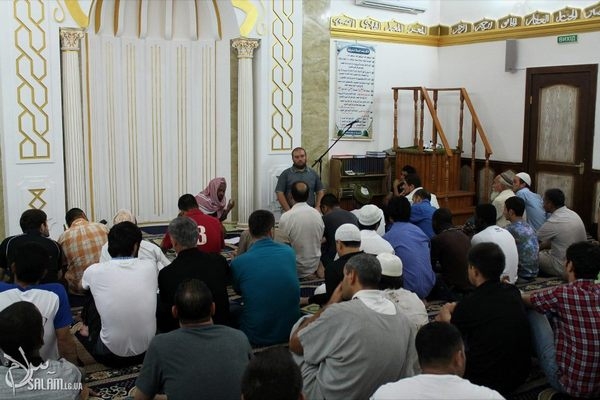Situation in the Eastern part of the country remains complicated in Ramadan as well. It is known that a considerable amount of Ukrainian Muslims live in Donbass. What Ramadan-2014 will be like and how the local community’s life changed? See answers in Muhammad al-Ustaz (Imam at Luhansk Cathedral Mosque) interview.
“Muslims, as well as Donbass people of other religions, are tired of the situation,” Shaikh Muhammad says. — “What a person must feel when constantly hearing gunshots in residential quarters? We all are awaiting for peaceful solvation of this conflict, so that we have our peace, public order and safety back.”Firefights stopped for some time after the temporary truce was announced, but the general situation remained the same: there are no people in the streets, as many of them left the region.
“Our mosque used to host 500 people and more at the Friday prayers, and now only 100-120 Muslims are present. Same thing with the everyday prayers: we have five times less parishioners than usual. We had to combine the evening and the night prayers so that people could leave the mosque while it’s still light and get home safely.”
It bears reminding that it’s been two months since a night-time curfew (11PM - 6AM) was established in Luhansk. For that reason, Muslims do not gather at the mosque for the morning prayer. According to Imam, Ramadan will be completely different for the local Muslims this year: “We will adjust our Ramadan programme according to the events occurring in the city. We’ve prepared several scenarios in advance.”
Number of scenarios is not too big as a matter of fact. Night prayer (Isha) in Luhansk is performed at about 23:30, and taraweeh cal last long after midnight. There’s no public transport at that time already, and the night-time curfew is in force. This made the mosque cancel iftars and taraweeh prayers. The believers have to perform taraweeh prayers individually, at their homes. “I’d call it a homey worship,” — Muhammad al-Ustaz says.
The other scenario is based on the Muslim community’s hopes for peaceful solution of the conflict. In this case, joint iftars will be held at the mosque, and people who come for taraweeh prayers would have to stay there until end of curfew at 6AM. The night programme after iftar would include taraweeh, lectures, Qur’an recitation, night worshiping, sukhoor and morning prayer, after which the believers could have some rest in the mosque until 6AM. Such programmes, however, won’t be held on a daily basis, rather on weekends (for instance).
“These are the decisions we made for our Ramada programme this time, but it depends greatly how how the situation will progress in the future,” — the Imam summarized.
Staff reporter



